Analysis of WIPO, WTO, and Innovation in Technology Management
VerifiedAdded on 2020/01/16
|12
|3736
|167
Report
AI Summary
This report provides a comprehensive analysis of the World Intellectual Property Organization (WIPO) and the World Trade Organization (WTO), examining their roles in protecting intellectual property rights and fostering innovation in international business. The study reviews the literature on innovation, technology management, and the impact of globalization on business processes. It critically evaluates WIPO's potential in shaping international intellectual property rules and resolving disputes, while also assessing the work of WTO in regulating global trade and facilitating technological advancements. The report explores the connection between technology, innovation, and the strategic issues faced by international firms, highlighting factors like customer understanding, market insights, and technological development. Furthermore, it investigates the influence of organizations like WIPO and WTO on the European Union's trade policies and regulatory frameworks. The report concludes by discussing the importance of transparency and the challenges faced by these organizations in the rapidly changing technological landscape. This analysis provides valuable insights into the dynamic interplay between innovation, technology, and international business, offering a solid foundation for understanding the complexities of global trade and intellectual property protection.
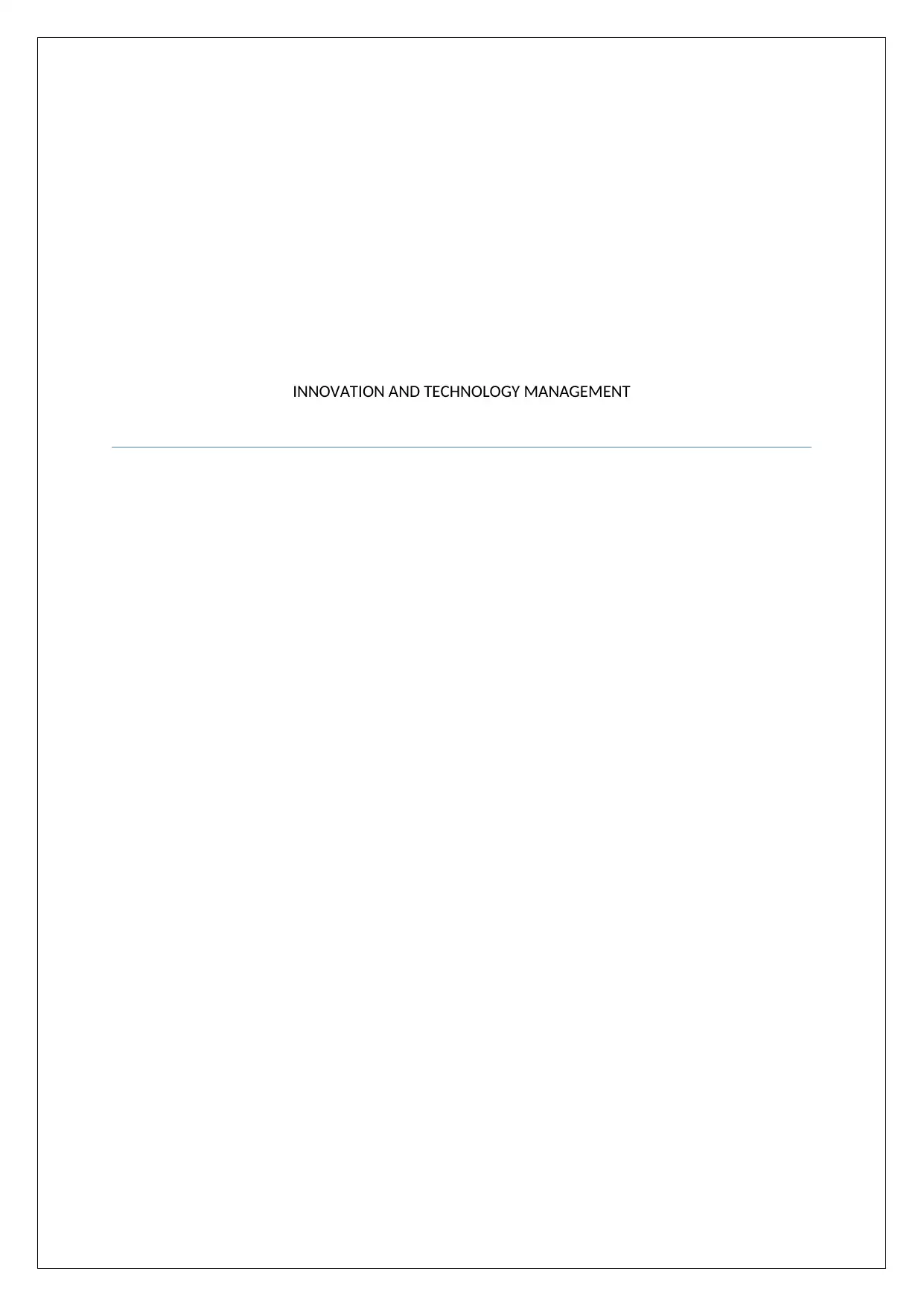
INNOVATION AND TECHNOLOGY MANAGEMENT
Paraphrase This Document
Need a fresh take? Get an instant paraphrase of this document with our AI Paraphraser
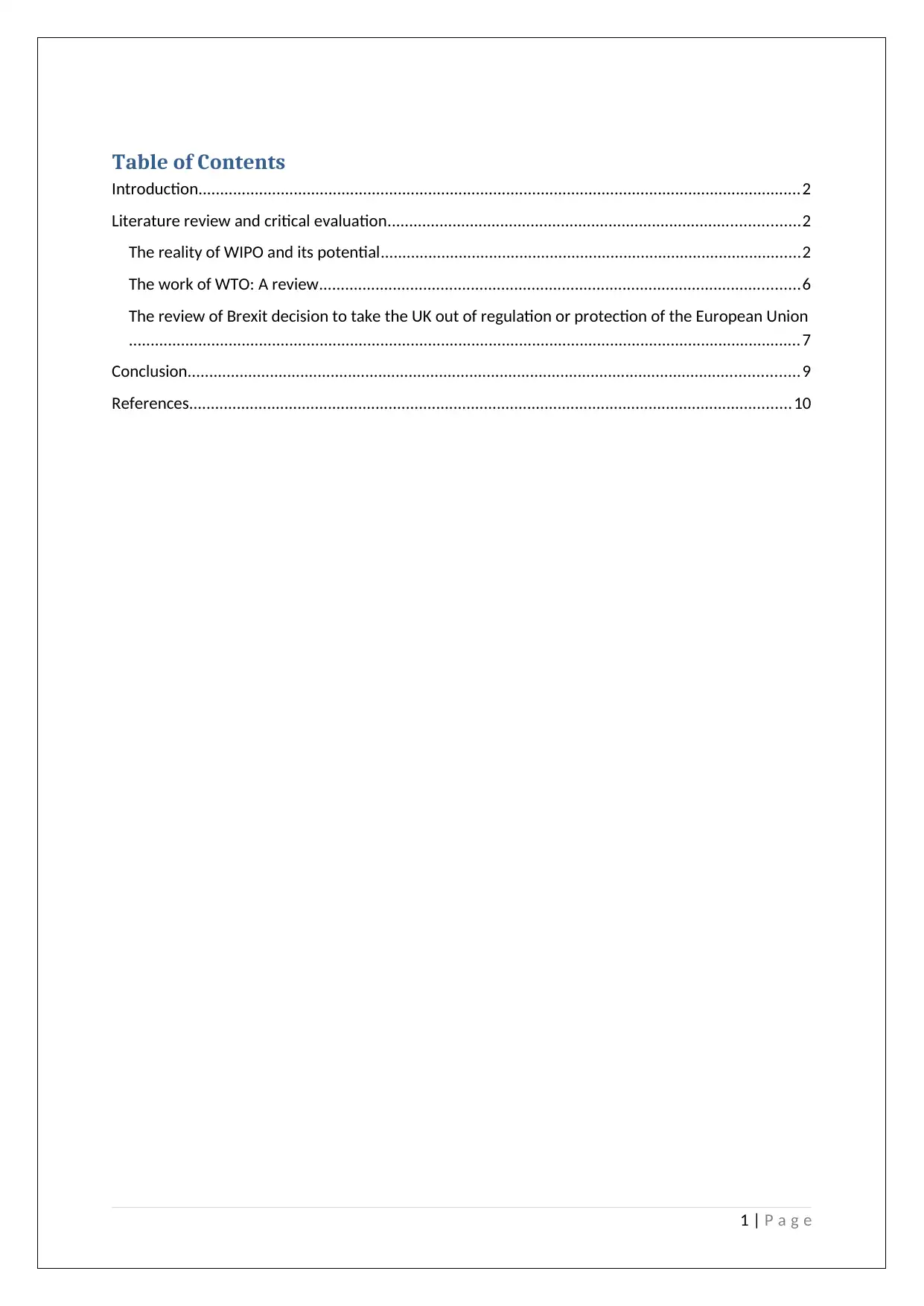
Table of Contents
Introduction...........................................................................................................................................2
Literature review and critical evaluation...............................................................................................2
The reality of WIPO and its potential.................................................................................................2
The work of WTO: A review...............................................................................................................6
The review of Brexit decision to take the UK out of regulation or protection of the European Union
...........................................................................................................................................................7
Conclusion.............................................................................................................................................9
References...........................................................................................................................................10
1 | P a g e
Introduction...........................................................................................................................................2
Literature review and critical evaluation...............................................................................................2
The reality of WIPO and its potential.................................................................................................2
The work of WTO: A review...............................................................................................................6
The review of Brexit decision to take the UK out of regulation or protection of the European Union
...........................................................................................................................................................7
Conclusion.............................................................................................................................................9
References...........................................................................................................................................10
1 | P a g e
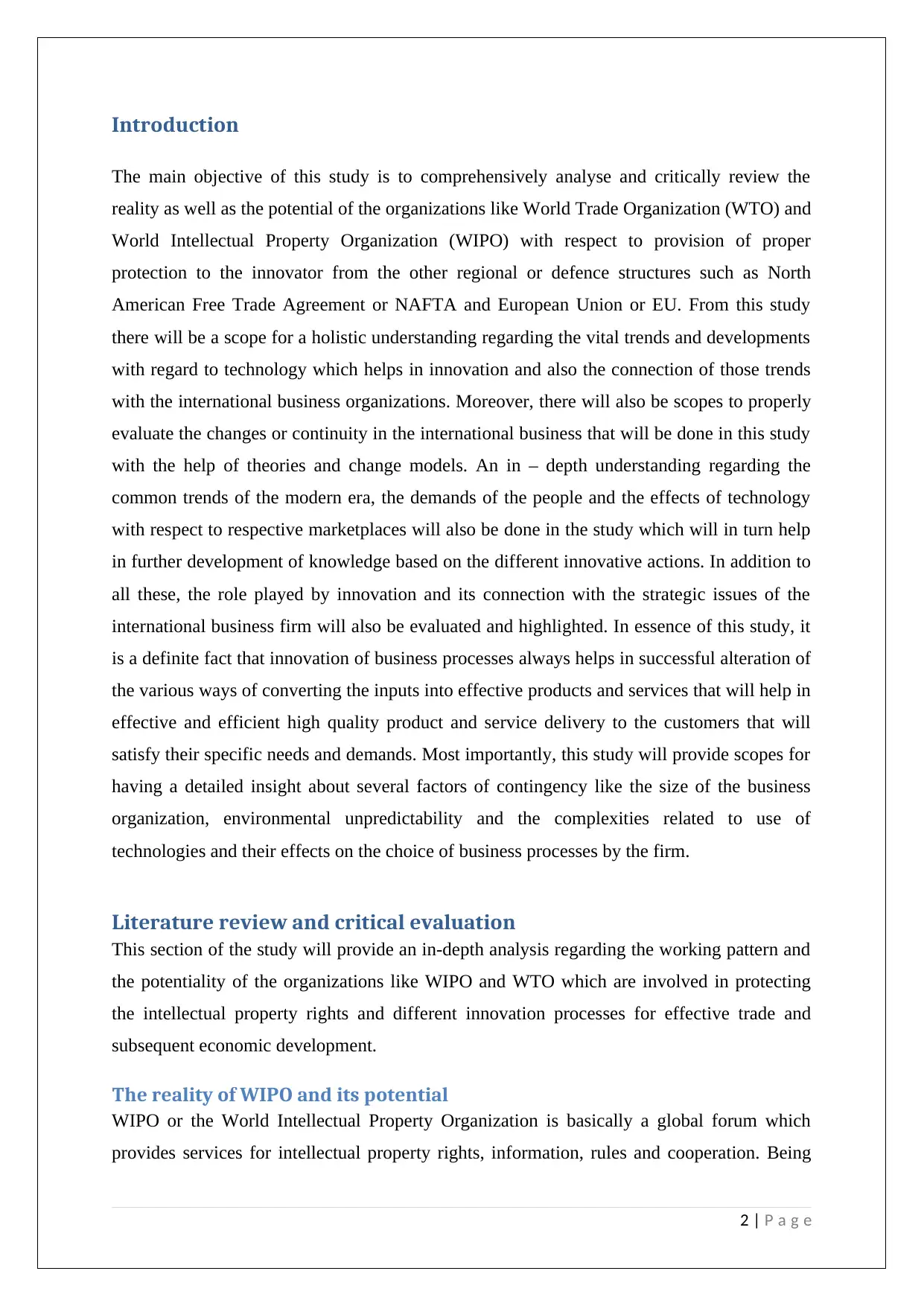
Introduction
The main objective of this study is to comprehensively analyse and critically review the
reality as well as the potential of the organizations like World Trade Organization (WTO) and
World Intellectual Property Organization (WIPO) with respect to provision of proper
protection to the innovator from the other regional or defence structures such as North
American Free Trade Agreement or NAFTA and European Union or EU. From this study
there will be a scope for a holistic understanding regarding the vital trends and developments
with regard to technology which helps in innovation and also the connection of those trends
with the international business organizations. Moreover, there will also be scopes to properly
evaluate the changes or continuity in the international business that will be done in this study
with the help of theories and change models. An in – depth understanding regarding the
common trends of the modern era, the demands of the people and the effects of technology
with respect to respective marketplaces will also be done in the study which will in turn help
in further development of knowledge based on the different innovative actions. In addition to
all these, the role played by innovation and its connection with the strategic issues of the
international business firm will also be evaluated and highlighted. In essence of this study, it
is a definite fact that innovation of business processes always helps in successful alteration of
the various ways of converting the inputs into effective products and services that will help in
effective and efficient high quality product and service delivery to the customers that will
satisfy their specific needs and demands. Most importantly, this study will provide scopes for
having a detailed insight about several factors of contingency like the size of the business
organization, environmental unpredictability and the complexities related to use of
technologies and their effects on the choice of business processes by the firm.
Literature review and critical evaluation
This section of the study will provide an in-depth analysis regarding the working pattern and
the potentiality of the organizations like WIPO and WTO which are involved in protecting
the intellectual property rights and different innovation processes for effective trade and
subsequent economic development.
The reality of WIPO and its potential
WIPO or the World Intellectual Property Organization is basically a global forum which
provides services for intellectual property rights, information, rules and cooperation. Being
2 | P a g e
The main objective of this study is to comprehensively analyse and critically review the
reality as well as the potential of the organizations like World Trade Organization (WTO) and
World Intellectual Property Organization (WIPO) with respect to provision of proper
protection to the innovator from the other regional or defence structures such as North
American Free Trade Agreement or NAFTA and European Union or EU. From this study
there will be a scope for a holistic understanding regarding the vital trends and developments
with regard to technology which helps in innovation and also the connection of those trends
with the international business organizations. Moreover, there will also be scopes to properly
evaluate the changes or continuity in the international business that will be done in this study
with the help of theories and change models. An in – depth understanding regarding the
common trends of the modern era, the demands of the people and the effects of technology
with respect to respective marketplaces will also be done in the study which will in turn help
in further development of knowledge based on the different innovative actions. In addition to
all these, the role played by innovation and its connection with the strategic issues of the
international business firm will also be evaluated and highlighted. In essence of this study, it
is a definite fact that innovation of business processes always helps in successful alteration of
the various ways of converting the inputs into effective products and services that will help in
effective and efficient high quality product and service delivery to the customers that will
satisfy their specific needs and demands. Most importantly, this study will provide scopes for
having a detailed insight about several factors of contingency like the size of the business
organization, environmental unpredictability and the complexities related to use of
technologies and their effects on the choice of business processes by the firm.
Literature review and critical evaluation
This section of the study will provide an in-depth analysis regarding the working pattern and
the potentiality of the organizations like WIPO and WTO which are involved in protecting
the intellectual property rights and different innovation processes for effective trade and
subsequent economic development.
The reality of WIPO and its potential
WIPO or the World Intellectual Property Organization is basically a global forum which
provides services for intellectual property rights, information, rules and cooperation. Being
2 | P a g e
⊘ This is a preview!⊘
Do you want full access?
Subscribe today to unlock all pages.

Trusted by 1+ million students worldwide
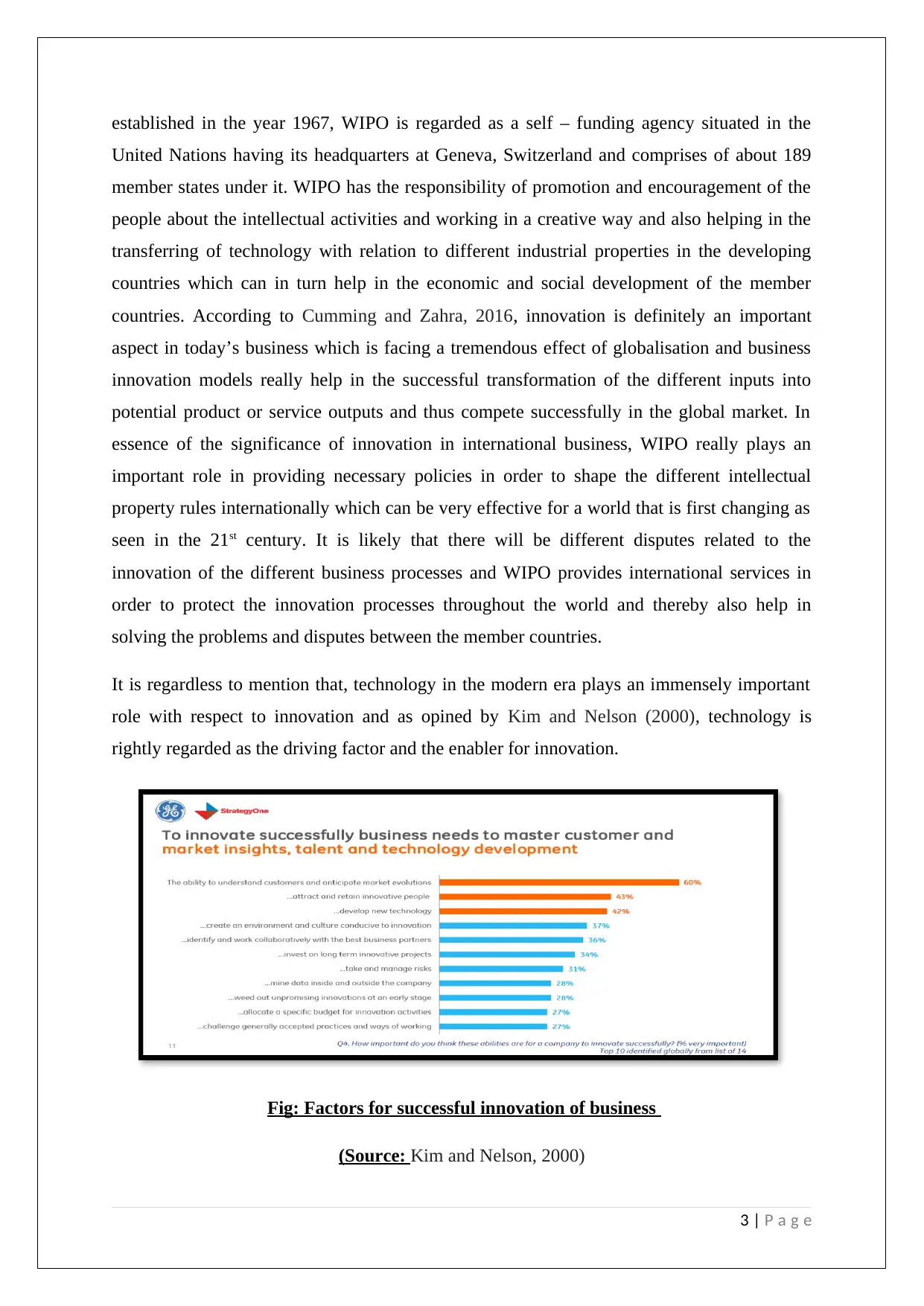
established in the year 1967, WIPO is regarded as a self – funding agency situated in the
United Nations having its headquarters at Geneva, Switzerland and comprises of about 189
member states under it. WIPO has the responsibility of promotion and encouragement of the
people about the intellectual activities and working in a creative way and also helping in the
transferring of technology with relation to different industrial properties in the developing
countries which can in turn help in the economic and social development of the member
countries. According to Cumming and Zahra, 2016, innovation is definitely an important
aspect in today’s business which is facing a tremendous effect of globalisation and business
innovation models really help in the successful transformation of the different inputs into
potential product or service outputs and thus compete successfully in the global market. In
essence of the significance of innovation in international business, WIPO really plays an
important role in providing necessary policies in order to shape the different intellectual
property rules internationally which can be very effective for a world that is first changing as
seen in the 21st century. It is likely that there will be different disputes related to the
innovation of the different business processes and WIPO provides international services in
order to protect the innovation processes throughout the world and thereby also help in
solving the problems and disputes between the member countries.
It is regardless to mention that, technology in the modern era plays an immensely important
role with respect to innovation and as opined by Kim and Nelson (2000), technology is
rightly regarded as the driving factor and the enabler for innovation.
Fig: Factors for successful innovation of business
(Source: Kim and Nelson, 2000)
3 | P a g e
United Nations having its headquarters at Geneva, Switzerland and comprises of about 189
member states under it. WIPO has the responsibility of promotion and encouragement of the
people about the intellectual activities and working in a creative way and also helping in the
transferring of technology with relation to different industrial properties in the developing
countries which can in turn help in the economic and social development of the member
countries. According to Cumming and Zahra, 2016, innovation is definitely an important
aspect in today’s business which is facing a tremendous effect of globalisation and business
innovation models really help in the successful transformation of the different inputs into
potential product or service outputs and thus compete successfully in the global market. In
essence of the significance of innovation in international business, WIPO really plays an
important role in providing necessary policies in order to shape the different intellectual
property rules internationally which can be very effective for a world that is first changing as
seen in the 21st century. It is likely that there will be different disputes related to the
innovation of the different business processes and WIPO provides international services in
order to protect the innovation processes throughout the world and thereby also help in
solving the problems and disputes between the member countries.
It is regardless to mention that, technology in the modern era plays an immensely important
role with respect to innovation and as opined by Kim and Nelson (2000), technology is
rightly regarded as the driving factor and the enabler for innovation.
Fig: Factors for successful innovation of business
(Source: Kim and Nelson, 2000)
3 | P a g e
Paraphrase This Document
Need a fresh take? Get an instant paraphrase of this document with our AI Paraphraser
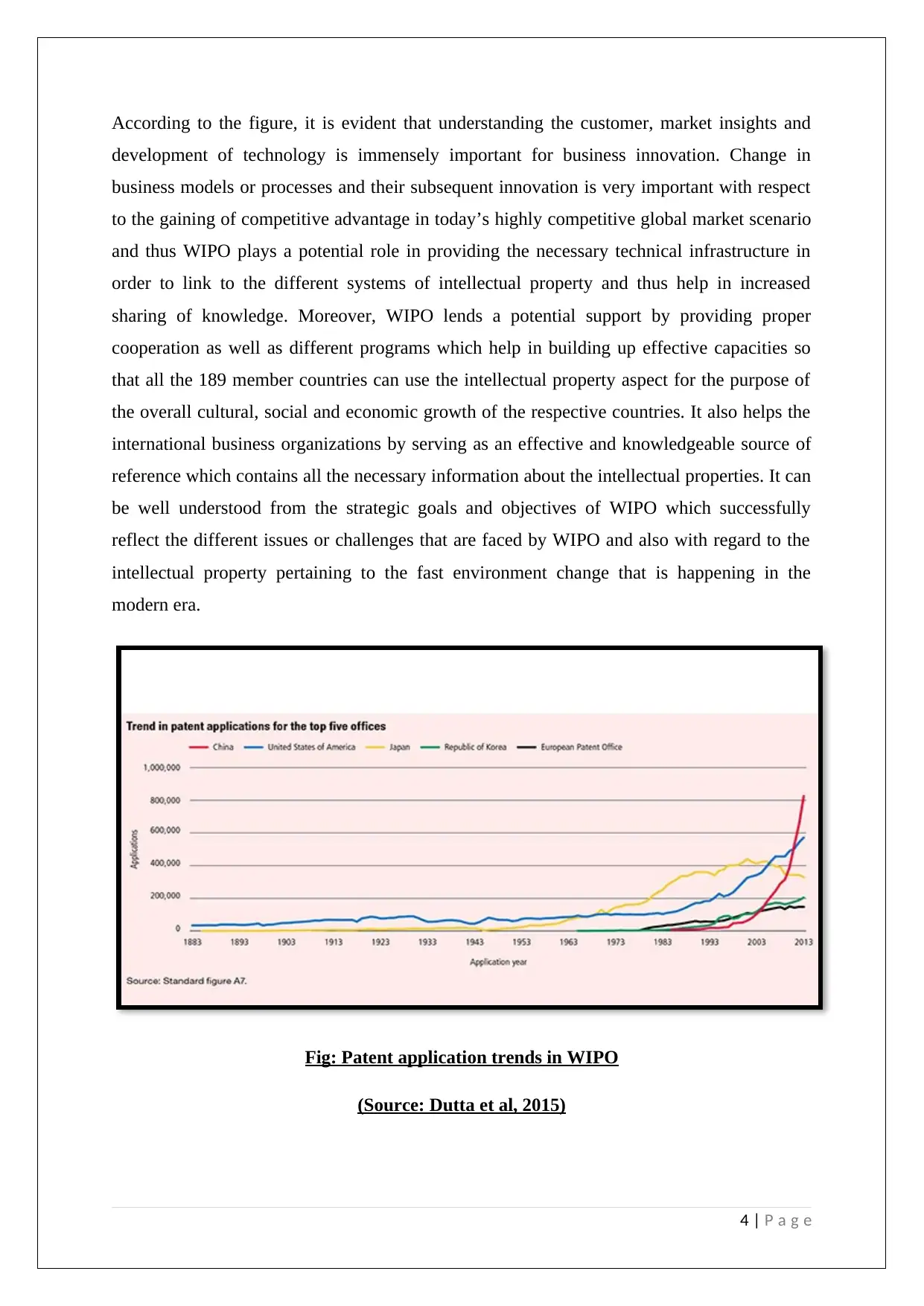
According to the figure, it is evident that understanding the customer, market insights and
development of technology is immensely important for business innovation. Change in
business models or processes and their subsequent innovation is very important with respect
to the gaining of competitive advantage in today’s highly competitive global market scenario
and thus WIPO plays a potential role in providing the necessary technical infrastructure in
order to link to the different systems of intellectual property and thus help in increased
sharing of knowledge. Moreover, WIPO lends a potential support by providing proper
cooperation as well as different programs which help in building up effective capacities so
that all the 189 member countries can use the intellectual property aspect for the purpose of
the overall cultural, social and economic growth of the respective countries. It also helps the
international business organizations by serving as an effective and knowledgeable source of
reference which contains all the necessary information about the intellectual properties. It can
be well understood from the strategic goals and objectives of WIPO which successfully
reflect the different issues or challenges that are faced by WIPO and also with regard to the
intellectual property pertaining to the fast environment change that is happening in the
modern era.
Fig: Patent application trends in WIPO
(Source: Dutta et al, 2015)
4 | P a g e
development of technology is immensely important for business innovation. Change in
business models or processes and their subsequent innovation is very important with respect
to the gaining of competitive advantage in today’s highly competitive global market scenario
and thus WIPO plays a potential role in providing the necessary technical infrastructure in
order to link to the different systems of intellectual property and thus help in increased
sharing of knowledge. Moreover, WIPO lends a potential support by providing proper
cooperation as well as different programs which help in building up effective capacities so
that all the 189 member countries can use the intellectual property aspect for the purpose of
the overall cultural, social and economic growth of the respective countries. It also helps the
international business organizations by serving as an effective and knowledgeable source of
reference which contains all the necessary information about the intellectual properties. It can
be well understood from the strategic goals and objectives of WIPO which successfully
reflect the different issues or challenges that are faced by WIPO and also with regard to the
intellectual property pertaining to the fast environment change that is happening in the
modern era.
Fig: Patent application trends in WIPO
(Source: Dutta et al, 2015)
4 | P a g e
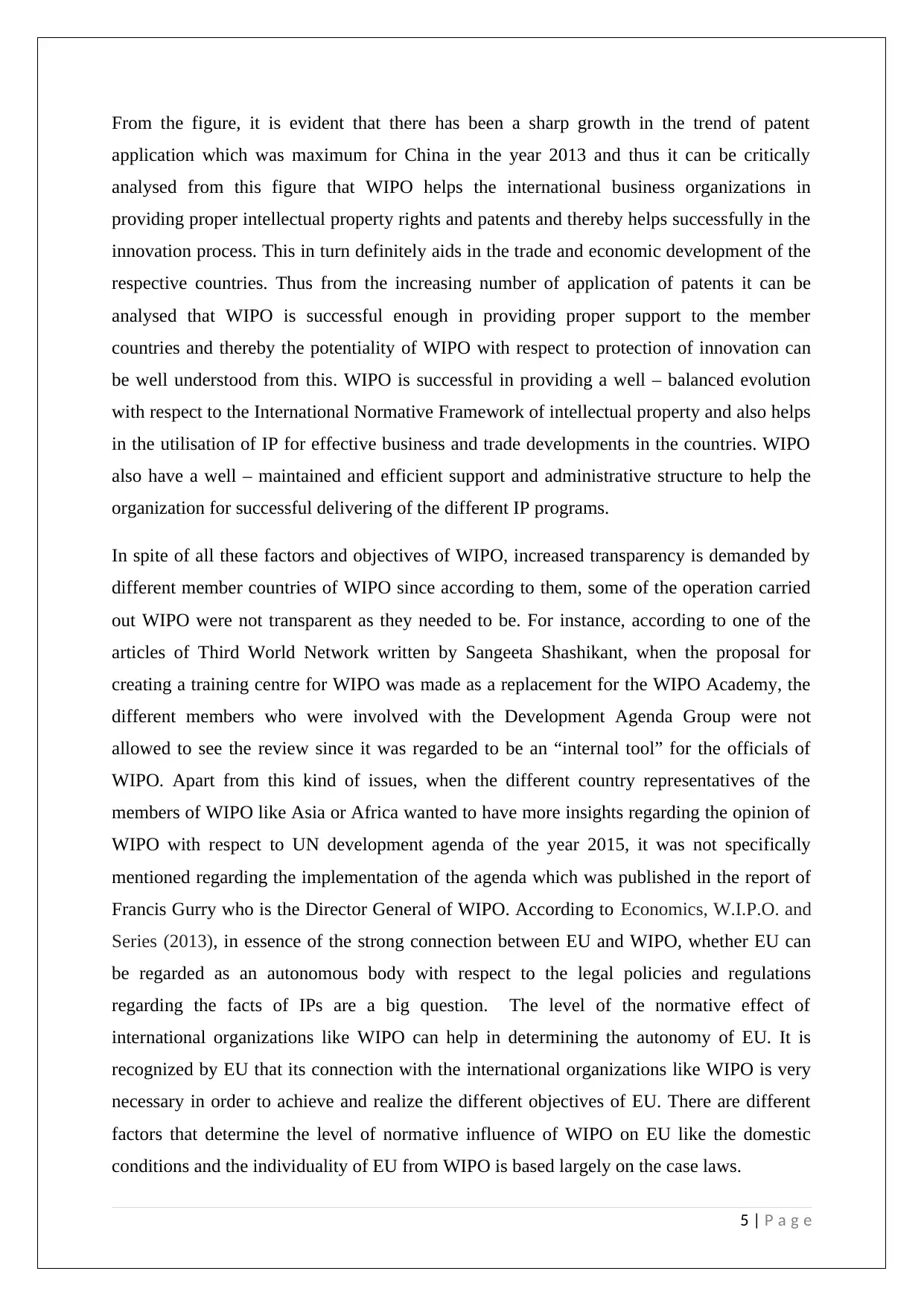
From the figure, it is evident that there has been a sharp growth in the trend of patent
application which was maximum for China in the year 2013 and thus it can be critically
analysed from this figure that WIPO helps the international business organizations in
providing proper intellectual property rights and patents and thereby helps successfully in the
innovation process. This in turn definitely aids in the trade and economic development of the
respective countries. Thus from the increasing number of application of patents it can be
analysed that WIPO is successful enough in providing proper support to the member
countries and thereby the potentiality of WIPO with respect to protection of innovation can
be well understood from this. WIPO is successful in providing a well – balanced evolution
with respect to the International Normative Framework of intellectual property and also helps
in the utilisation of IP for effective business and trade developments in the countries. WIPO
also have a well – maintained and efficient support and administrative structure to help the
organization for successful delivering of the different IP programs.
In spite of all these factors and objectives of WIPO, increased transparency is demanded by
different member countries of WIPO since according to them, some of the operation carried
out WIPO were not transparent as they needed to be. For instance, according to one of the
articles of Third World Network written by Sangeeta Shashikant, when the proposal for
creating a training centre for WIPO was made as a replacement for the WIPO Academy, the
different members who were involved with the Development Agenda Group were not
allowed to see the review since it was regarded to be an “internal tool” for the officials of
WIPO. Apart from this kind of issues, when the different country representatives of the
members of WIPO like Asia or Africa wanted to have more insights regarding the opinion of
WIPO with respect to UN development agenda of the year 2015, it was not specifically
mentioned regarding the implementation of the agenda which was published in the report of
Francis Gurry who is the Director General of WIPO. According to Economics, W.I.P.O. and
Series (2013), in essence of the strong connection between EU and WIPO, whether EU can
be regarded as an autonomous body with respect to the legal policies and regulations
regarding the facts of IPs are a big question. The level of the normative effect of
international organizations like WIPO can help in determining the autonomy of EU. It is
recognized by EU that its connection with the international organizations like WIPO is very
necessary in order to achieve and realize the different objectives of EU. There are different
factors that determine the level of normative influence of WIPO on EU like the domestic
conditions and the individuality of EU from WIPO is based largely on the case laws.
5 | P a g e
application which was maximum for China in the year 2013 and thus it can be critically
analysed from this figure that WIPO helps the international business organizations in
providing proper intellectual property rights and patents and thereby helps successfully in the
innovation process. This in turn definitely aids in the trade and economic development of the
respective countries. Thus from the increasing number of application of patents it can be
analysed that WIPO is successful enough in providing proper support to the member
countries and thereby the potentiality of WIPO with respect to protection of innovation can
be well understood from this. WIPO is successful in providing a well – balanced evolution
with respect to the International Normative Framework of intellectual property and also helps
in the utilisation of IP for effective business and trade developments in the countries. WIPO
also have a well – maintained and efficient support and administrative structure to help the
organization for successful delivering of the different IP programs.
In spite of all these factors and objectives of WIPO, increased transparency is demanded by
different member countries of WIPO since according to them, some of the operation carried
out WIPO were not transparent as they needed to be. For instance, according to one of the
articles of Third World Network written by Sangeeta Shashikant, when the proposal for
creating a training centre for WIPO was made as a replacement for the WIPO Academy, the
different members who were involved with the Development Agenda Group were not
allowed to see the review since it was regarded to be an “internal tool” for the officials of
WIPO. Apart from this kind of issues, when the different country representatives of the
members of WIPO like Asia or Africa wanted to have more insights regarding the opinion of
WIPO with respect to UN development agenda of the year 2015, it was not specifically
mentioned regarding the implementation of the agenda which was published in the report of
Francis Gurry who is the Director General of WIPO. According to Economics, W.I.P.O. and
Series (2013), in essence of the strong connection between EU and WIPO, whether EU can
be regarded as an autonomous body with respect to the legal policies and regulations
regarding the facts of IPs are a big question. The level of the normative effect of
international organizations like WIPO can help in determining the autonomy of EU. It is
recognized by EU that its connection with the international organizations like WIPO is very
necessary in order to achieve and realize the different objectives of EU. There are different
factors that determine the level of normative influence of WIPO on EU like the domestic
conditions and the individuality of EU from WIPO is based largely on the case laws.
5 | P a g e
⊘ This is a preview!⊘
Do you want full access?
Subscribe today to unlock all pages.

Trusted by 1+ million students worldwide
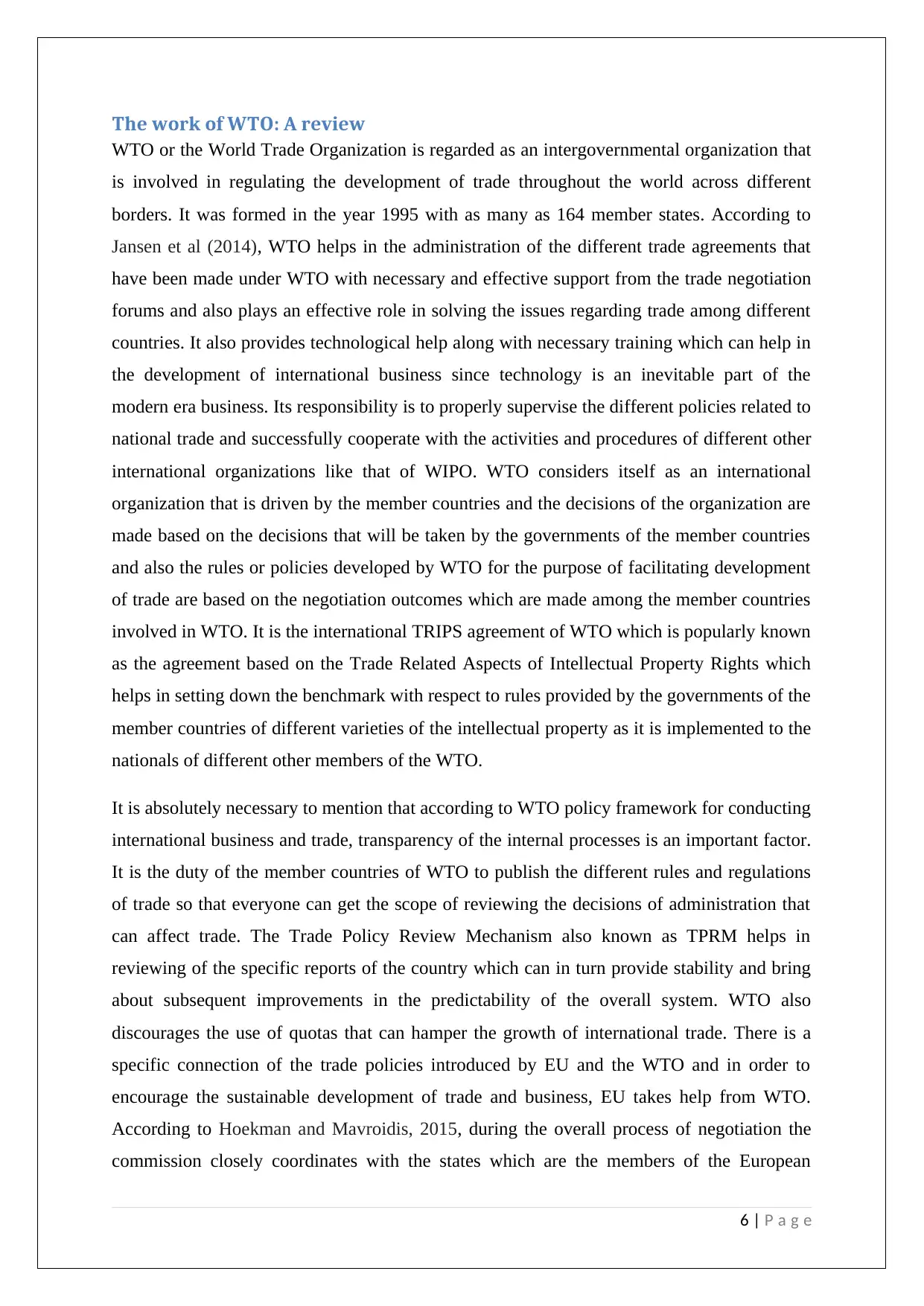
The work of WTO: A review
WTO or the World Trade Organization is regarded as an intergovernmental organization that
is involved in regulating the development of trade throughout the world across different
borders. It was formed in the year 1995 with as many as 164 member states. According to
Jansen et al (2014), WTO helps in the administration of the different trade agreements that
have been made under WTO with necessary and effective support from the trade negotiation
forums and also plays an effective role in solving the issues regarding trade among different
countries. It also provides technological help along with necessary training which can help in
the development of international business since technology is an inevitable part of the
modern era business. Its responsibility is to properly supervise the different policies related to
national trade and successfully cooperate with the activities and procedures of different other
international organizations like that of WIPO. WTO considers itself as an international
organization that is driven by the member countries and the decisions of the organization are
made based on the decisions that will be taken by the governments of the member countries
and also the rules or policies developed by WTO for the purpose of facilitating development
of trade are based on the negotiation outcomes which are made among the member countries
involved in WTO. It is the international TRIPS agreement of WTO which is popularly known
as the agreement based on the Trade Related Aspects of Intellectual Property Rights which
helps in setting down the benchmark with respect to rules provided by the governments of the
member countries of different varieties of the intellectual property as it is implemented to the
nationals of different other members of the WTO.
It is absolutely necessary to mention that according to WTO policy framework for conducting
international business and trade, transparency of the internal processes is an important factor.
It is the duty of the member countries of WTO to publish the different rules and regulations
of trade so that everyone can get the scope of reviewing the decisions of administration that
can affect trade. The Trade Policy Review Mechanism also known as TPRM helps in
reviewing of the specific reports of the country which can in turn provide stability and bring
about subsequent improvements in the predictability of the overall system. WTO also
discourages the use of quotas that can hamper the growth of international trade. There is a
specific connection of the trade policies introduced by EU and the WTO and in order to
encourage the sustainable development of trade and business, EU takes help from WTO.
According to Hoekman and Mavroidis, 2015, during the overall process of negotiation the
commission closely coordinates with the states which are the members of the European
6 | P a g e
WTO or the World Trade Organization is regarded as an intergovernmental organization that
is involved in regulating the development of trade throughout the world across different
borders. It was formed in the year 1995 with as many as 164 member states. According to
Jansen et al (2014), WTO helps in the administration of the different trade agreements that
have been made under WTO with necessary and effective support from the trade negotiation
forums and also plays an effective role in solving the issues regarding trade among different
countries. It also provides technological help along with necessary training which can help in
the development of international business since technology is an inevitable part of the
modern era business. Its responsibility is to properly supervise the different policies related to
national trade and successfully cooperate with the activities and procedures of different other
international organizations like that of WIPO. WTO considers itself as an international
organization that is driven by the member countries and the decisions of the organization are
made based on the decisions that will be taken by the governments of the member countries
and also the rules or policies developed by WTO for the purpose of facilitating development
of trade are based on the negotiation outcomes which are made among the member countries
involved in WTO. It is the international TRIPS agreement of WTO which is popularly known
as the agreement based on the Trade Related Aspects of Intellectual Property Rights which
helps in setting down the benchmark with respect to rules provided by the governments of the
member countries of different varieties of the intellectual property as it is implemented to the
nationals of different other members of the WTO.
It is absolutely necessary to mention that according to WTO policy framework for conducting
international business and trade, transparency of the internal processes is an important factor.
It is the duty of the member countries of WTO to publish the different rules and regulations
of trade so that everyone can get the scope of reviewing the decisions of administration that
can affect trade. The Trade Policy Review Mechanism also known as TPRM helps in
reviewing of the specific reports of the country which can in turn provide stability and bring
about subsequent improvements in the predictability of the overall system. WTO also
discourages the use of quotas that can hamper the growth of international trade. There is a
specific connection of the trade policies introduced by EU and the WTO and in order to
encourage the sustainable development of trade and business, EU takes help from WTO.
According to Hoekman and Mavroidis, 2015, during the overall process of negotiation the
commission closely coordinates with the states which are the members of the European
6 | P a g e
Paraphrase This Document
Need a fresh take? Get an instant paraphrase of this document with our AI Paraphraser
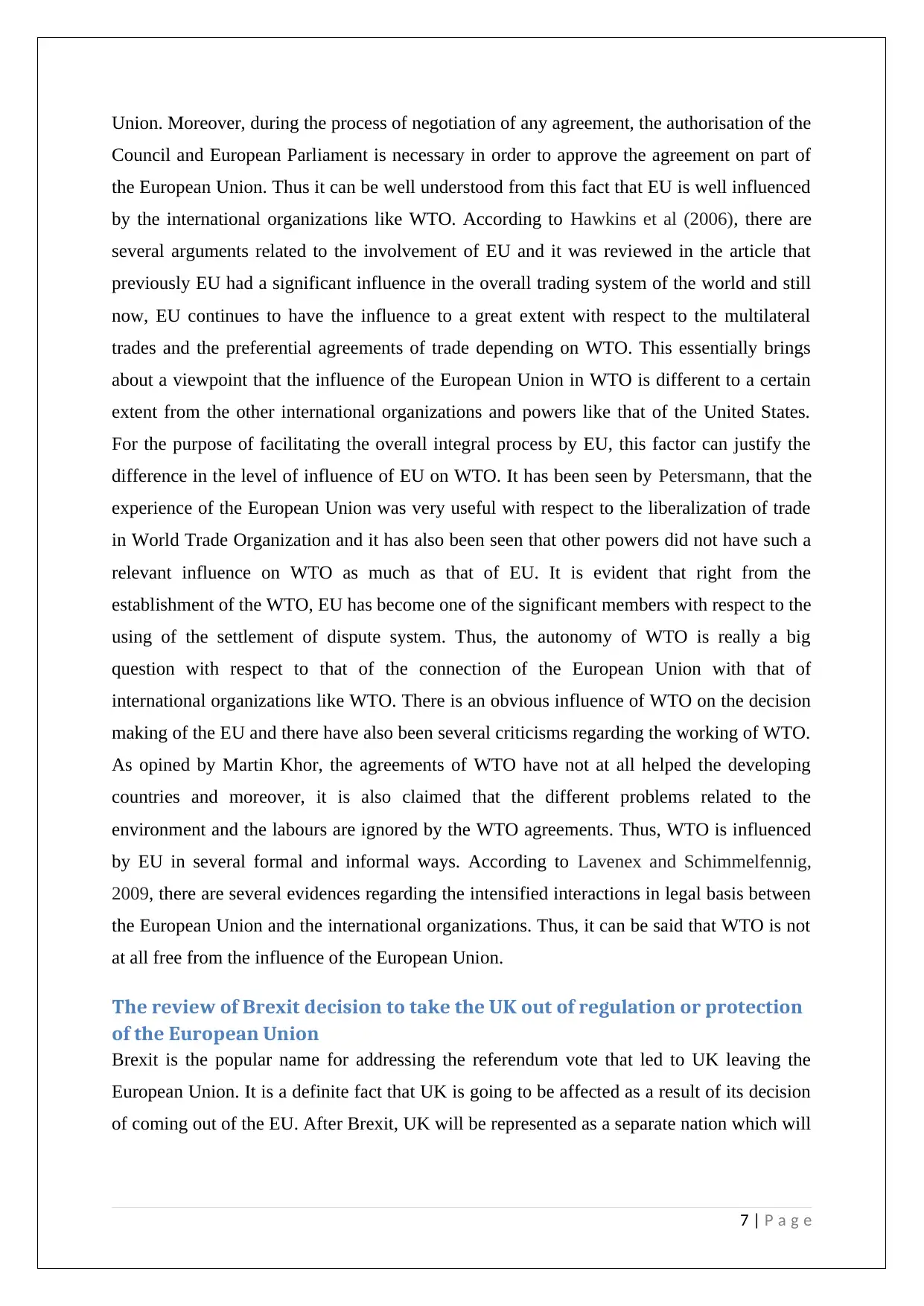
Union. Moreover, during the process of negotiation of any agreement, the authorisation of the
Council and European Parliament is necessary in order to approve the agreement on part of
the European Union. Thus it can be well understood from this fact that EU is well influenced
by the international organizations like WTO. According to Hawkins et al (2006), there are
several arguments related to the involvement of EU and it was reviewed in the article that
previously EU had a significant influence in the overall trading system of the world and still
now, EU continues to have the influence to a great extent with respect to the multilateral
trades and the preferential agreements of trade depending on WTO. This essentially brings
about a viewpoint that the influence of the European Union in WTO is different to a certain
extent from the other international organizations and powers like that of the United States.
For the purpose of facilitating the overall integral process by EU, this factor can justify the
difference in the level of influence of EU on WTO. It has been seen by Petersmann, that the
experience of the European Union was very useful with respect to the liberalization of trade
in World Trade Organization and it has also been seen that other powers did not have such a
relevant influence on WTO as much as that of EU. It is evident that right from the
establishment of the WTO, EU has become one of the significant members with respect to the
using of the settlement of dispute system. Thus, the autonomy of WTO is really a big
question with respect to that of the connection of the European Union with that of
international organizations like WTO. There is an obvious influence of WTO on the decision
making of the EU and there have also been several criticisms regarding the working of WTO.
As opined by Martin Khor, the agreements of WTO have not at all helped the developing
countries and moreover, it is also claimed that the different problems related to the
environment and the labours are ignored by the WTO agreements. Thus, WTO is influenced
by EU in several formal and informal ways. According to Lavenex and Schimmelfennig,
2009, there are several evidences regarding the intensified interactions in legal basis between
the European Union and the international organizations. Thus, it can be said that WTO is not
at all free from the influence of the European Union.
The review of Brexit decision to take the UK out of regulation or protection
of the European Union
Brexit is the popular name for addressing the referendum vote that led to UK leaving the
European Union. It is a definite fact that UK is going to be affected as a result of its decision
of coming out of the EU. After Brexit, UK will be represented as a separate nation which will
7 | P a g e
Council and European Parliament is necessary in order to approve the agreement on part of
the European Union. Thus it can be well understood from this fact that EU is well influenced
by the international organizations like WTO. According to Hawkins et al (2006), there are
several arguments related to the involvement of EU and it was reviewed in the article that
previously EU had a significant influence in the overall trading system of the world and still
now, EU continues to have the influence to a great extent with respect to the multilateral
trades and the preferential agreements of trade depending on WTO. This essentially brings
about a viewpoint that the influence of the European Union in WTO is different to a certain
extent from the other international organizations and powers like that of the United States.
For the purpose of facilitating the overall integral process by EU, this factor can justify the
difference in the level of influence of EU on WTO. It has been seen by Petersmann, that the
experience of the European Union was very useful with respect to the liberalization of trade
in World Trade Organization and it has also been seen that other powers did not have such a
relevant influence on WTO as much as that of EU. It is evident that right from the
establishment of the WTO, EU has become one of the significant members with respect to the
using of the settlement of dispute system. Thus, the autonomy of WTO is really a big
question with respect to that of the connection of the European Union with that of
international organizations like WTO. There is an obvious influence of WTO on the decision
making of the EU and there have also been several criticisms regarding the working of WTO.
As opined by Martin Khor, the agreements of WTO have not at all helped the developing
countries and moreover, it is also claimed that the different problems related to the
environment and the labours are ignored by the WTO agreements. Thus, WTO is influenced
by EU in several formal and informal ways. According to Lavenex and Schimmelfennig,
2009, there are several evidences regarding the intensified interactions in legal basis between
the European Union and the international organizations. Thus, it can be said that WTO is not
at all free from the influence of the European Union.
The review of Brexit decision to take the UK out of regulation or protection
of the European Union
Brexit is the popular name for addressing the referendum vote that led to UK leaving the
European Union. It is a definite fact that UK is going to be affected as a result of its decision
of coming out of the EU. After Brexit, UK will be represented as a separate nation which will
7 | P a g e
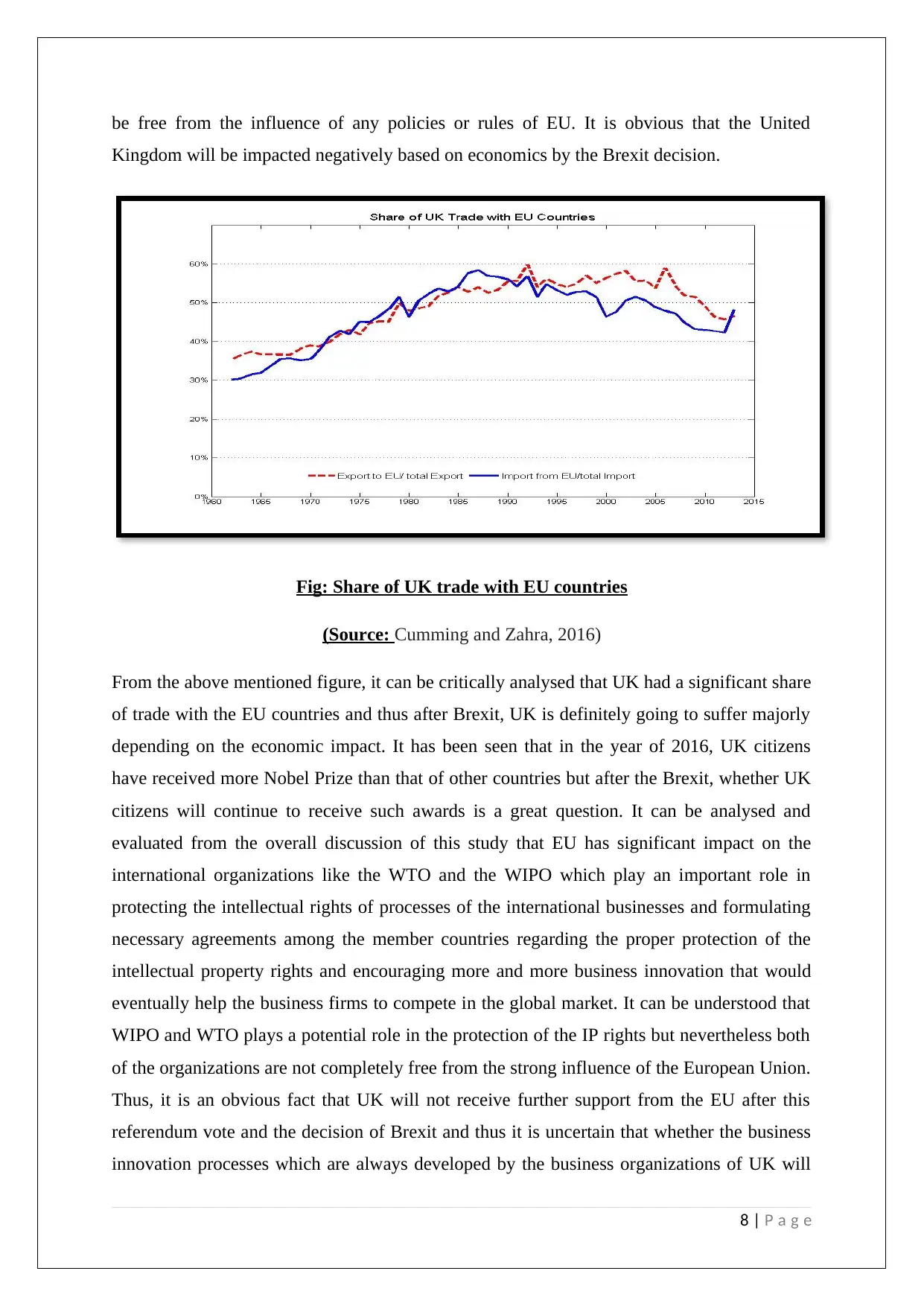
be free from the influence of any policies or rules of EU. It is obvious that the United
Kingdom will be impacted negatively based on economics by the Brexit decision.
Fig: Share of UK trade with EU countries
(Source: Cumming and Zahra, 2016)
From the above mentioned figure, it can be critically analysed that UK had a significant share
of trade with the EU countries and thus after Brexit, UK is definitely going to suffer majorly
depending on the economic impact. It has been seen that in the year of 2016, UK citizens
have received more Nobel Prize than that of other countries but after the Brexit, whether UK
citizens will continue to receive such awards is a great question. It can be analysed and
evaluated from the overall discussion of this study that EU has significant impact on the
international organizations like the WTO and the WIPO which play an important role in
protecting the intellectual rights of processes of the international businesses and formulating
necessary agreements among the member countries regarding the proper protection of the
intellectual property rights and encouraging more and more business innovation that would
eventually help the business firms to compete in the global market. It can be understood that
WIPO and WTO plays a potential role in the protection of the IP rights but nevertheless both
of the organizations are not completely free from the strong influence of the European Union.
Thus, it is an obvious fact that UK will not receive further support from the EU after this
referendum vote and the decision of Brexit and thus it is uncertain that whether the business
innovation processes which are always developed by the business organizations of UK will
8 | P a g e
Kingdom will be impacted negatively based on economics by the Brexit decision.
Fig: Share of UK trade with EU countries
(Source: Cumming and Zahra, 2016)
From the above mentioned figure, it can be critically analysed that UK had a significant share
of trade with the EU countries and thus after Brexit, UK is definitely going to suffer majorly
depending on the economic impact. It has been seen that in the year of 2016, UK citizens
have received more Nobel Prize than that of other countries but after the Brexit, whether UK
citizens will continue to receive such awards is a great question. It can be analysed and
evaluated from the overall discussion of this study that EU has significant impact on the
international organizations like the WTO and the WIPO which play an important role in
protecting the intellectual rights of processes of the international businesses and formulating
necessary agreements among the member countries regarding the proper protection of the
intellectual property rights and encouraging more and more business innovation that would
eventually help the business firms to compete in the global market. It can be understood that
WIPO and WTO plays a potential role in the protection of the IP rights but nevertheless both
of the organizations are not completely free from the strong influence of the European Union.
Thus, it is an obvious fact that UK will not receive further support from the EU after this
referendum vote and the decision of Brexit and thus it is uncertain that whether the business
innovation processes which are always developed by the business organizations of UK will
8 | P a g e
⊘ This is a preview!⊘
Do you want full access?
Subscribe today to unlock all pages.

Trusted by 1+ million students worldwide
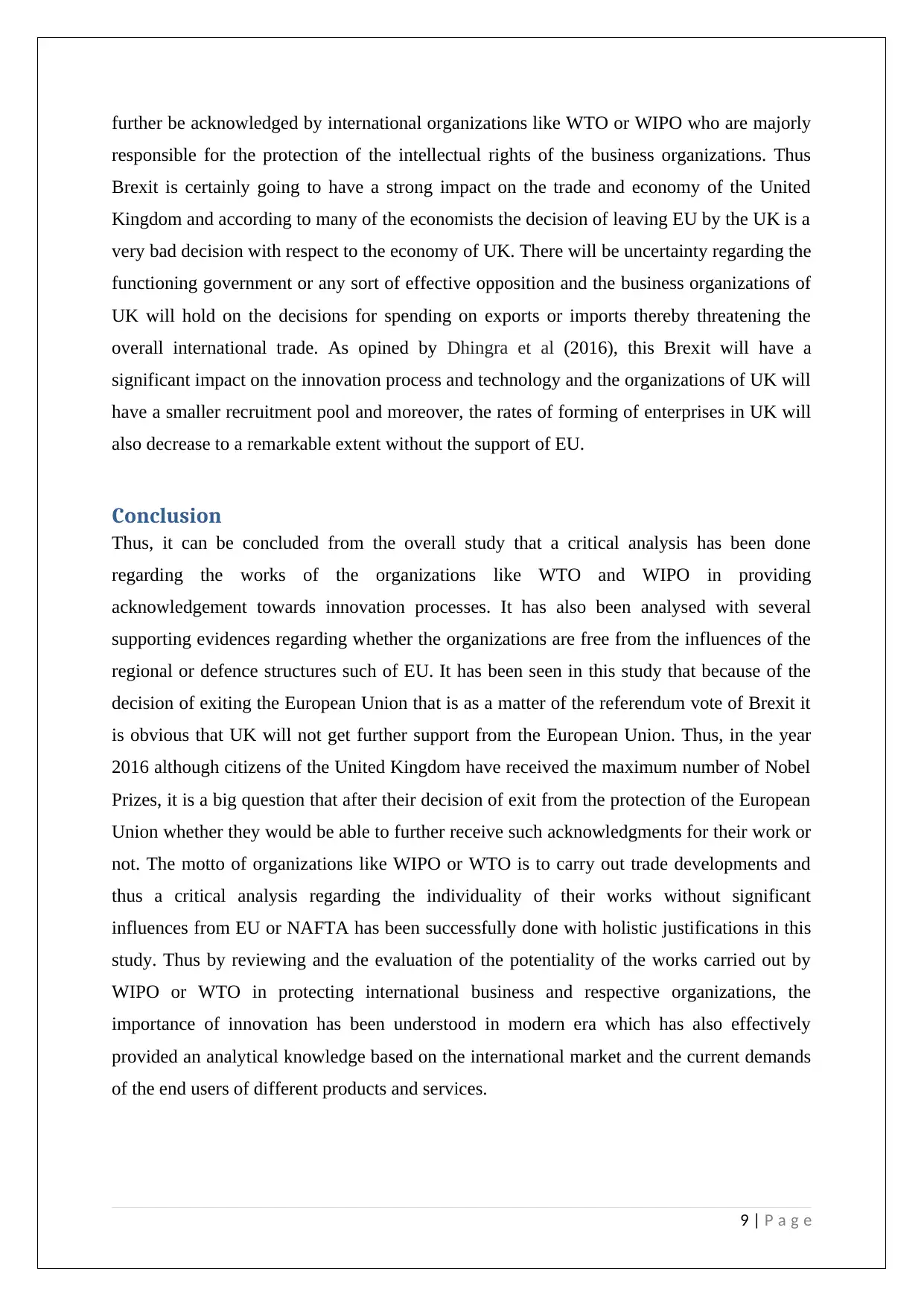
further be acknowledged by international organizations like WTO or WIPO who are majorly
responsible for the protection of the intellectual rights of the business organizations. Thus
Brexit is certainly going to have a strong impact on the trade and economy of the United
Kingdom and according to many of the economists the decision of leaving EU by the UK is a
very bad decision with respect to the economy of UK. There will be uncertainty regarding the
functioning government or any sort of effective opposition and the business organizations of
UK will hold on the decisions for spending on exports or imports thereby threatening the
overall international trade. As opined by Dhingra et al (2016), this Brexit will have a
significant impact on the innovation process and technology and the organizations of UK will
have a smaller recruitment pool and moreover, the rates of forming of enterprises in UK will
also decrease to a remarkable extent without the support of EU.
Conclusion
Thus, it can be concluded from the overall study that a critical analysis has been done
regarding the works of the organizations like WTO and WIPO in providing
acknowledgement towards innovation processes. It has also been analysed with several
supporting evidences regarding whether the organizations are free from the influences of the
regional or defence structures such of EU. It has been seen in this study that because of the
decision of exiting the European Union that is as a matter of the referendum vote of Brexit it
is obvious that UK will not get further support from the European Union. Thus, in the year
2016 although citizens of the United Kingdom have received the maximum number of Nobel
Prizes, it is a big question that after their decision of exit from the protection of the European
Union whether they would be able to further receive such acknowledgments for their work or
not. The motto of organizations like WIPO or WTO is to carry out trade developments and
thus a critical analysis regarding the individuality of their works without significant
influences from EU or NAFTA has been successfully done with holistic justifications in this
study. Thus by reviewing and the evaluation of the potentiality of the works carried out by
WIPO or WTO in protecting international business and respective organizations, the
importance of innovation has been understood in modern era which has also effectively
provided an analytical knowledge based on the international market and the current demands
of the end users of different products and services.
9 | P a g e
responsible for the protection of the intellectual rights of the business organizations. Thus
Brexit is certainly going to have a strong impact on the trade and economy of the United
Kingdom and according to many of the economists the decision of leaving EU by the UK is a
very bad decision with respect to the economy of UK. There will be uncertainty regarding the
functioning government or any sort of effective opposition and the business organizations of
UK will hold on the decisions for spending on exports or imports thereby threatening the
overall international trade. As opined by Dhingra et al (2016), this Brexit will have a
significant impact on the innovation process and technology and the organizations of UK will
have a smaller recruitment pool and moreover, the rates of forming of enterprises in UK will
also decrease to a remarkable extent without the support of EU.
Conclusion
Thus, it can be concluded from the overall study that a critical analysis has been done
regarding the works of the organizations like WTO and WIPO in providing
acknowledgement towards innovation processes. It has also been analysed with several
supporting evidences regarding whether the organizations are free from the influences of the
regional or defence structures such of EU. It has been seen in this study that because of the
decision of exiting the European Union that is as a matter of the referendum vote of Brexit it
is obvious that UK will not get further support from the European Union. Thus, in the year
2016 although citizens of the United Kingdom have received the maximum number of Nobel
Prizes, it is a big question that after their decision of exit from the protection of the European
Union whether they would be able to further receive such acknowledgments for their work or
not. The motto of organizations like WIPO or WTO is to carry out trade developments and
thus a critical analysis regarding the individuality of their works without significant
influences from EU or NAFTA has been successfully done with holistic justifications in this
study. Thus by reviewing and the evaluation of the potentiality of the works carried out by
WIPO or WTO in protecting international business and respective organizations, the
importance of innovation has been understood in modern era which has also effectively
provided an analytical knowledge based on the international market and the current demands
of the end users of different products and services.
9 | P a g e
Paraphrase This Document
Need a fresh take? Get an instant paraphrase of this document with our AI Paraphraser
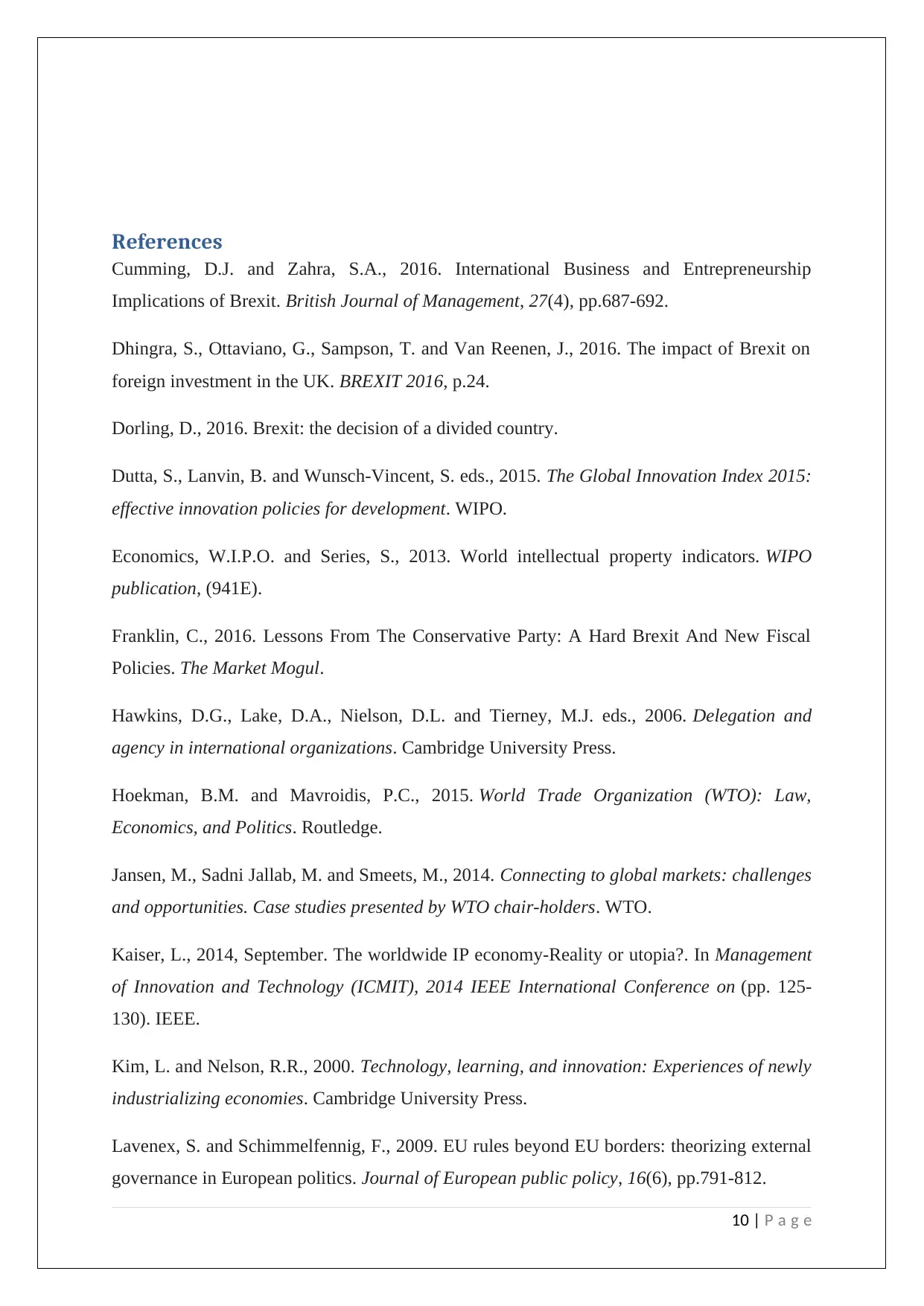
References
Cumming, D.J. and Zahra, S.A., 2016. International Business and Entrepreneurship
Implications of Brexit. British Journal of Management, 27(4), pp.687-692.
Dhingra, S., Ottaviano, G., Sampson, T. and Van Reenen, J., 2016. The impact of Brexit on
foreign investment in the UK. BREXIT 2016, p.24.
Dorling, D., 2016. Brexit: the decision of a divided country.
Dutta, S., Lanvin, B. and Wunsch-Vincent, S. eds., 2015. The Global Innovation Index 2015:
effective innovation policies for development. WIPO.
Economics, W.I.P.O. and Series, S., 2013. World intellectual property indicators. WIPO
publication, (941E).
Franklin, C., 2016. Lessons From The Conservative Party: A Hard Brexit And New Fiscal
Policies. The Market Mogul.
Hawkins, D.G., Lake, D.A., Nielson, D.L. and Tierney, M.J. eds., 2006. Delegation and
agency in international organizations. Cambridge University Press.
Hoekman, B.M. and Mavroidis, P.C., 2015. World Trade Organization (WTO): Law,
Economics, and Politics. Routledge.
Jansen, M., Sadni Jallab, M. and Smeets, M., 2014. Connecting to global markets: challenges
and opportunities. Case studies presented by WTO chair-holders. WTO.
Kaiser, L., 2014, September. The worldwide IP economy-Reality or utopia?. In Management
of Innovation and Technology (ICMIT), 2014 IEEE International Conference on (pp. 125-
130). IEEE.
Kim, L. and Nelson, R.R., 2000. Technology, learning, and innovation: Experiences of newly
industrializing economies. Cambridge University Press.
Lavenex, S. and Schimmelfennig, F., 2009. EU rules beyond EU borders: theorizing external
governance in European politics. Journal of European public policy, 16(6), pp.791-812.
10 | P a g e
Cumming, D.J. and Zahra, S.A., 2016. International Business and Entrepreneurship
Implications of Brexit. British Journal of Management, 27(4), pp.687-692.
Dhingra, S., Ottaviano, G., Sampson, T. and Van Reenen, J., 2016. The impact of Brexit on
foreign investment in the UK. BREXIT 2016, p.24.
Dorling, D., 2016. Brexit: the decision of a divided country.
Dutta, S., Lanvin, B. and Wunsch-Vincent, S. eds., 2015. The Global Innovation Index 2015:
effective innovation policies for development. WIPO.
Economics, W.I.P.O. and Series, S., 2013. World intellectual property indicators. WIPO
publication, (941E).
Franklin, C., 2016. Lessons From The Conservative Party: A Hard Brexit And New Fiscal
Policies. The Market Mogul.
Hawkins, D.G., Lake, D.A., Nielson, D.L. and Tierney, M.J. eds., 2006. Delegation and
agency in international organizations. Cambridge University Press.
Hoekman, B.M. and Mavroidis, P.C., 2015. World Trade Organization (WTO): Law,
Economics, and Politics. Routledge.
Jansen, M., Sadni Jallab, M. and Smeets, M., 2014. Connecting to global markets: challenges
and opportunities. Case studies presented by WTO chair-holders. WTO.
Kaiser, L., 2014, September. The worldwide IP economy-Reality or utopia?. In Management
of Innovation and Technology (ICMIT), 2014 IEEE International Conference on (pp. 125-
130). IEEE.
Kim, L. and Nelson, R.R., 2000. Technology, learning, and innovation: Experiences of newly
industrializing economies. Cambridge University Press.
Lavenex, S. and Schimmelfennig, F., 2009. EU rules beyond EU borders: theorizing external
governance in European politics. Journal of European public policy, 16(6), pp.791-812.
10 | P a g e
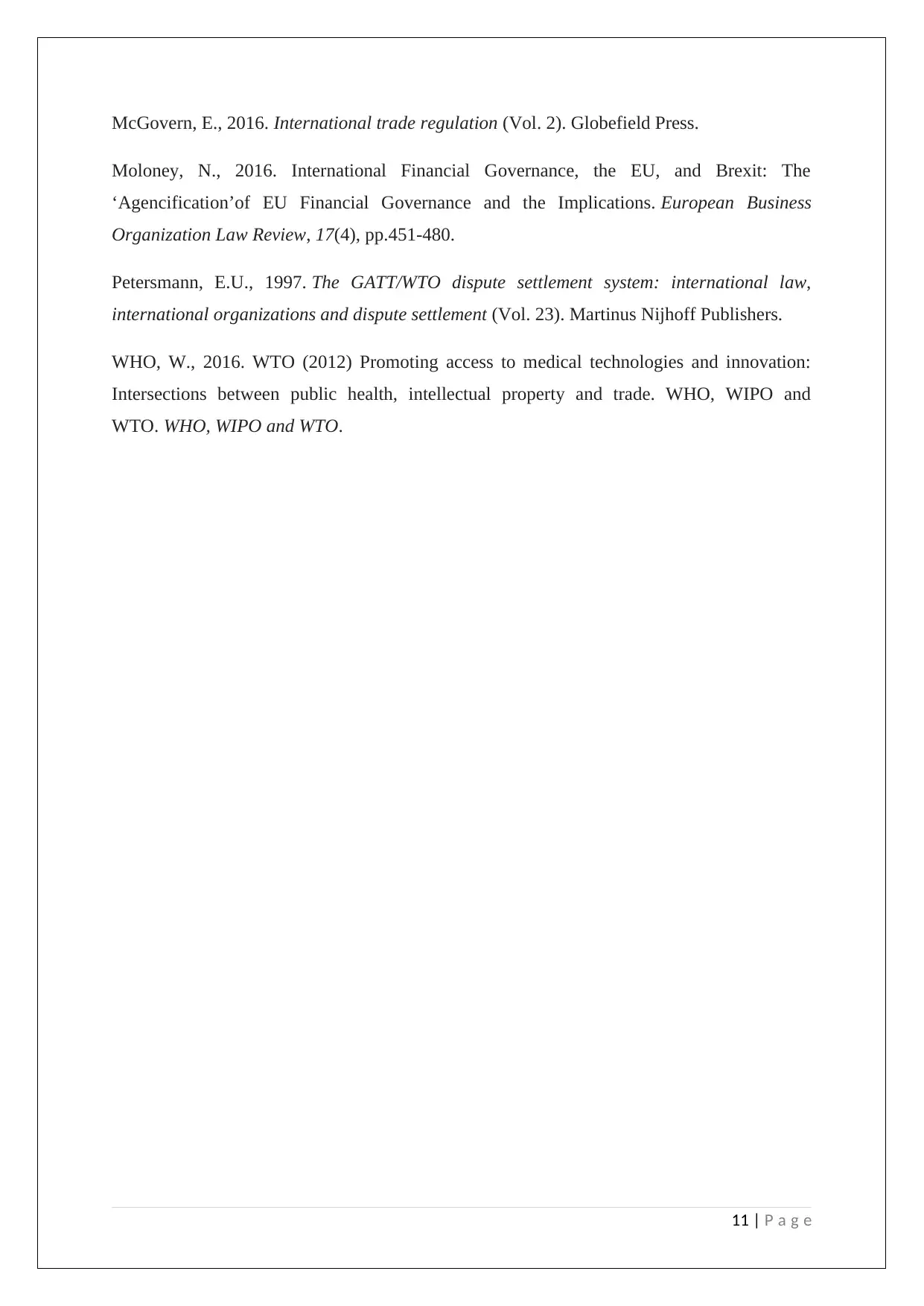
McGovern, E., 2016. International trade regulation (Vol. 2). Globefield Press.
Moloney, N., 2016. International Financial Governance, the EU, and Brexit: The
‘Agencification’of EU Financial Governance and the Implications. European Business
Organization Law Review, 17(4), pp.451-480.
Petersmann, E.U., 1997. The GATT/WTO dispute settlement system: international law,
international organizations and dispute settlement (Vol. 23). Martinus Nijhoff Publishers.
WHO, W., 2016. WTO (2012) Promoting access to medical technologies and innovation:
Intersections between public health, intellectual property and trade. WHO, WIPO and
WTO. WHO, WIPO and WTO.
11 | P a g e
Moloney, N., 2016. International Financial Governance, the EU, and Brexit: The
‘Agencification’of EU Financial Governance and the Implications. European Business
Organization Law Review, 17(4), pp.451-480.
Petersmann, E.U., 1997. The GATT/WTO dispute settlement system: international law,
international organizations and dispute settlement (Vol. 23). Martinus Nijhoff Publishers.
WHO, W., 2016. WTO (2012) Promoting access to medical technologies and innovation:
Intersections between public health, intellectual property and trade. WHO, WIPO and
WTO. WHO, WIPO and WTO.
11 | P a g e
⊘ This is a preview!⊘
Do you want full access?
Subscribe today to unlock all pages.

Trusted by 1+ million students worldwide
1 out of 12
Related Documents
Your All-in-One AI-Powered Toolkit for Academic Success.
+13062052269
info@desklib.com
Available 24*7 on WhatsApp / Email
![[object Object]](/_next/static/media/star-bottom.7253800d.svg)
Unlock your academic potential
Copyright © 2020–2026 A2Z Services. All Rights Reserved. Developed and managed by ZUCOL.




